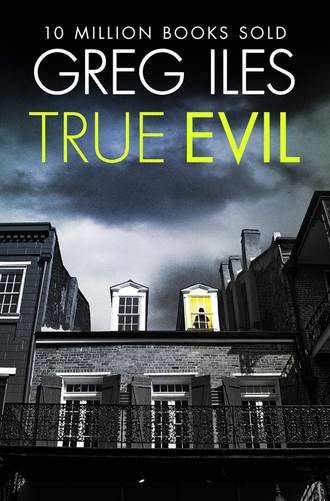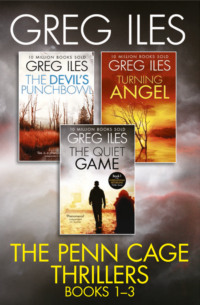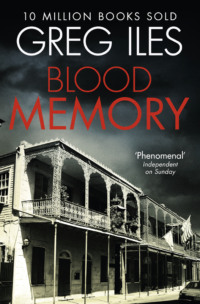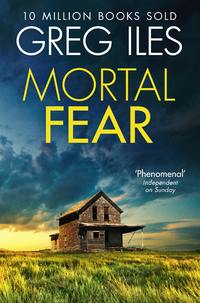
Полная версия
True Evil
“I’ll call you back when I get the story on Morse. Could be today. Probably tomorrow, though.”
“Any time is fine. Hey, where are you living now?”
“Still the Windy City. It’s nice this time of year, but I froze my ass off last winter. I’m ready for Miami or L.A.”
“Good luck.”
“Yeah. Talk to you soon.”
Chris stuffed his phone back into the seat pouch and dug in hard. There were cars and trucks moving along the Trace now, most carrying workers who lived beyond the borders of the long but narrow strip of federal land. The speed limit on the Trace was fifty—great for bikers if the commuters had observed it, but none did. Checking his watch, he realized that he probably wouldn’t make it home in time to take Ben to school. That would make Thora wonder, but he’d had to do something to dissipate the tension that Morse’s visit had caused.
Now Foster’s call had canceled out any relief he’d felt from the exercise. He had more information now, but no real answers. Alex Morse was a star FBI agent who’d screwed up and gotten someone killed. Fine. She’d admitted the screw-up herself. But what was she now? A field agent working a legitimate case? Or a rogue agent working her sister’s murder without permission? In one respect it didn’t matter, because Chris was convinced that in her views of his situation, she was out of her goddamn mind.
He wrenched his handlebars to the right as a car blasted by from behind, its horn blaring, its tires spraying water. He almost took a spill on the shoulder, then made a last-second recovery and edged back onto the wet pavement. The driver was too far gone to see now, but Chris flipped him off anyway. He wouldn’t normally have done that, but then he wouldn’t normally have allowed a vehicle to catch him unawares on a seldom-traveled road.
As his tires thrummed along the pavement’s edge, he saw another biker in the distance, approaching on the opposite side of the Trace. As the distance closed, Chris saw that the rider was female. He raised his hand in greeting, then hit his brakes.
The rider was Alexandra Morse.
TEN
Agent Morse wasn’t wearing a biking helmet, but her dark hair was drawn back into a soaking-wet ponytail, making her facial scars all the more prominent. It was the scars that allowed Chris to recognize her. He could hardly believe her presence, and he was about ready to sprint right past her when she crossed the road and hissed to a stop a yard away from him.
“Good morning, Doctor.”
“What the hell are you doing?” he asked.
“I needed to talk to you. This seemed like a good way to do it.”
“How did you know I was here?”
Morse only smiled.
Chris looked her from head to toe, taking in the soaked clothes stuck to her body and her dripping ponytail. She had chill bumps on her arms and legs, and the cotton tulane law shirt she was wearing would take forever to dry, even if the rain stopped.
“And the bike?” he asked. “You a big cyclist?”
“No. I bought it four days ago, when I found out that you were a biker and your wife was a runner.”
“You’ve been following Thora, too?”
Morse’s smile faded. “I’ve shadowed a couple of her runs. She’s fast.”
“Jesus.” Chris shook his head and started to ride away.
“Wait!” Morse cried. “I’m not a threat, Dr. Shepard!”
He stopped and looked back. “I’m not so sure of that.”
“Why not?”
He thought of Darryl Foster’s words. “Call it instinct.”
“You have good instincts about sources of danger?”
“In the past I have.”
“Even when those sources are human?”
A red pickup truck whizzed past, its rider staring at them.
“Why don’t we keep riding?” Morse suggested. “We’ll be less noticeable talking that way.”
“I don’t intend to continue yesterday’s conversation.”
She looked incredulous. “Surely you must have some questions for me.”
Chris looked off into the trees, then turned and let some of his anger through his eyes. “Yes, I do. My first question is, did you personally see my wife go into this divorce lawyer’s office?”
Morse took a small step backward. “Not personally, no, but—”
“Who did?”
“Another agent.”
“How did he identify Thora?”
“He followed her down to her car, then took down her license plate.”
“Her license plate. No chance of a mistake? No chance he got one number wrong, and it could have been someone else?”
Morse shook her head. “He shot a picture of her.”
“Do you have that picture?”
“Not on me. But she was wearing a very distinctive outfit. A black silk dress with a white scarf and an Audrey Hepburn hat. Not many women can pull that kind of thing off anymore.”
Chris gritted his teeth. Thora had worn that same outfit to a party only a month ago. “Do you have any recordings of her conversation with the lawyer? Copies of any memos or files? Anything that proves what they talked about?”
Morse reluctantly shook her head.
“So you admit that it’s possible that they talked about wills and estates, or investments, or something else legitimate.”
Agent Morse looked down at her wet shoes. After a while, she looked back up and said, “It’s possible, yes.”
“But you don’t believe it.”
She bit her bottom lip but said nothing.
“Agent Morse, I happen to know from my wife’s recent behavior that what you suggested yesterday is impossible.”
The FBI agent looked intrigued, but instead of asking what he was talking about, she said, “It’s ten miles back to your truck. Why don’t we ride back together? I promise not to piss you off, if I can help it.”
Chris knew he could leave Morse behind in seconds. But for some reason—maybe just the manners he’d been raised with—he decided not to. He shrugged, climbed into his pedal clips, and started southward at an easy pace. Morse fell in beside him and immediately started talking.
“Have you called anybody about me?”
He decided to leave Darryl Foster out of the conversation. “I figured you’d already know the answer to that. Aren’t you tapping my phones?”
She ignored this. “I’m sure you have some questions for me, after all I said yesterday.”
Chris shook the rain out of his eyes. “I’ll admit I’ve done some thinking about what you told me, especially about the medical side.”
“Good. Go on.”
“I want to know more about these unexplained deaths, as you called them.”
“What do you want to know?”
“How the people died. Was it a stroke in every case?”
“No. Only my sister’s.”
“Really. What were the other causes of death?”
“Pulmonary embolism in one. Myocardial infarction in another.”
“What else?”
A hundred feet of road passed beneath them before Morse answered. “The rest were cancer.”
Chris looked sharply over at her, but Morse kept watching the road. “Cancer?”
She nodded over her handlebars, and water dripped off her nose. “Fatal malignancies.”
“You’re kidding, right?”
“No.”
“You’re telling me this cluster of suspicious deaths that has you so worked up involves people who’ve died of cancer?”
“Yes.”
He thought about this for a while. “How many victims were there? Total?”
“Nine deaths tied to the divorce lawyer I told you about. Six cancers that I’ve traced so far.”
“Same kind of tumor in every person?”
“That depends on how picky you are. They were all blood cancers.”
“Call me picky. Blood cancer encompasses a whole constellation of diseases, Agent Morse. There are over thirty different types of non-Hodgkin’s lymphomas alone. At least a dozen different leukemias. Were all the deaths from one type of blood cancer, at least?”
“No. Three leukemias, two lymphomas, one multiple myeloma.”
Chris shook his head. “You’re out of your mind. You really believe someone is murdering people by giving them different kinds of cancer?”
Morse looked over at him, and her eyes were as grim as any he’d ever seen.
“I know it.”
“That’s impossible.”
“Are you so sure? You’re not an oncologist.”
Chris snorted. “It doesn’t take an oncologist to realize that would be a stupid way to murder someone—even if it were possible. Even if you could somehow induce cancer in your victim, it could take years for that person to die, if they died at all. A lot of people survive leukemia now. Lymphomas, too. And people live well over five years with myeloma after bone marrow transplants. Some patients have two transplants and live ten years or more.”
“All these patients died in eighteen months or less.”
This brought him up short. “Eighteen months from diagnosis to death? All of them?”
“All but one. The myeloma patient lived twenty-three months after an autologous bone marrow transplant.”
“Aggressive cancers, then. Very aggressive.”
“Obviously.”
Morse wanted him to work this out for himself. “These people who died … they were all married to wealthy people?”
“All of them. To very wealthy people.”
“And all the surviving spouses were clients of the same divorce lawyer?”
Morse shook her head. “I never said that. I said all the surviving spouses wound up in business with the same divorce lawyer—and only after the deaths of their spouses. Big deals, mostly, one-offs that had nothing to do with the lawyer’s area of expertise.”
Chris nodded, but his mind was still on Morse’s cancer theory. “I don’t want to get into a technical argument, but even if all these patients died from leukemias, you’re talking about several different disease etiologies. And the actual carcinogenesis isn’t understood in a majority of types. Include the lymphomas, and you’re dealing with entirely different cell groups—the erythroid and B-cell malignancies—and the causes of those cancers are also unknown. The fact that your ‘blood cancers’ killed in less than eighteen months is probably their only similarity. In every other way they’re probably as different from each other as pancreatic cancer and a sarcoma. And if the best oncologists in the world don’t know what causes those cancers, who do you think could intentionally cause them to commit murder?”
“Radiation causes leukemia,” Morse said assertively. “You don’t have to be a genius to give someone cancer.”
She’s right, Chris realized. Many initial survivors of Hiroshima died of leukemia in the aftermath of the atomic bomb, as did many “survivors” of the Chernobyl disaster. Marie Curie died of leukemia caused by her radium experiments. You could cause sophisticated genetic damage with a metaphorically blunt instrument. His mind instantly jumped to the issue of access to gamma radiation. You’d have to consider physicians, dentists, veterinarians—hell, even some medical technologists had access to X-ray machines or the radioactive isotopes used for radiotherapy. Agent Morse’s theory was based on more than wild speculation. Yet the basic premise still seemed ludicrous to him.
“It’s been done before, you know,” Morse said.
“What has?”
“During the late 1930s, the Nazis experimented with ways of sterilizing large numbers of Jews without their knowledge. They asked subjects to sit at a desk and fill out some forms that would take about fifteen minutes. During that time, high-energy gamma rays were fired at their genitals from three sides. The experiment worked.”
“My God.”
“Why couldn’t someone do the same thing to an unsuspecting victim in a lawyer’s office?” Morse asked. “Or a dentist’s office?”
Chris pedaled harder but said nothing.
“You know that researchers purposely cause cancer in lab animals all the time, right?”
“Of course. They do it by injecting carcinogenic chemicals into the animals. And chemicals like that are traceable, Agent Morse. Forensically, I mean.”
She gave him a skeptical look. “In an ideal world. But you said yourself, it takes time to die from cancer. After eighteen months, all traces of the offending carcinogen could be gone. Benzene is a good example.”
Chris knit his brow in thought. “Benzene causes lung cancer, doesn’t it?”
“Also leukemia and multiple myeloma,” she informed him. “They proved that by testing factory workers with minor benzene exposure in Ohio and in China.”
She’s done her homework, he thought. Or someone has. “Have you done extensive toxicological studies in all these deaths?”
“Almost none of them.”
This stunned him. “Why not?”
“Several of the bodies were cremated before we became suspicious.”
“That’s convenient.”
“And in the other cases, we couldn’t get permission to exhume the bodies.”
“Again, why not?”
“It’s complicated.”
Chris sensed that he was being played. “I don’t buy that, Agent Morse. If the FBI wanted forensic studies, they’d get them. What about the families of these alleged victims? Did they suspect foul play? Is that how you got into this case? Or was it your sister’s accusation that started it all?”
Two big touring motorcycles swept around a long curve ahead, their lights illuminating the rain.
“The families of several victims suspected foul play from the beginning.”
“Even though their relatives died of cancer?”
“Yes. Most of the husbands we’re talking about are real bastards.”
Big surprise. “Had all of these alleged victims filed for divorce?”
“None had.”
“None? Did the husbands file, then?”
Morse looked over at him again. “Nobody filed.”
“Then what the hell happened? People consulted this lawyer but didn’t file?”
“Exactly. We think there’s probably a single consultation—maybe two visits, at most. The lawyer waits for a really wealthy client who stands to lose an enormous amount of money in his divorce. Or maybe the client stands to lose custody of his kids. But when the lawyer senses that he has a truly desperate client—a client with intense hatred for his spouse—he makes his pitch.”
“That’s an interesting scenario. Can you prove any of it?”
“Not yet. This lawyer is very savvy. Paranoid, in fact.”
Chris gazed at her in disbelief. “You can’t even prove that any murders have occurred, much less that anyone specific is involved. You’ve got nothing but speculation.”
“I have my sister’s word, Doctor.”
“Spoken on her deathbed, after a severe stroke.”
Morse’s face became a mask of defiant determination.
“I’m not trying to upset you,” Chris said. “I’m very sorry for your loss. I see that kind of tragedy week in and week out, and I know what it does to families.”
She said nothing.
“But you have to admit, it’s a pretty elaborate theory you’ve developed. It’s Hollywood stuff, in fact,” he said, recalling Foster’s words. “Not real life.”
Morse did not look angry; in fact, she looked mildly amused. “Dr. Shepard, in 1995, a forty-four-year-old neurologist was arrested at the Vanderbilt Medical Center with a six-inch syringe and a four-inch needle in his pocket. The syringe was filled with boric acid and salt water. I’m sure you know that solution would have been lethal if injected into a human heart.”
“That’s about the only thing a four-inch needle’s good for,” Chris thought aloud.
“The neurologist was planning to murder a physician who’d been his supervisor when he was a resident there. When police searched a storage unit he owned, they found books on assassination and the production of toxic biological agents. They also found a jar containing ricin, one of the deadliest poisons in the world. The neurologist had planned to soak the pages of a book with a solvent mixture that would promote the absorption of ricin through the skin.” Morse looked over at Chris with a raised eyebrow. “Is that elaborate enough for you?”
Chris shifted down two gears and pedaled ahead.
Morse quickly rode alongside him again. “In 1999, a woman in San Jose, California, was admitted to the hospital with nausea and blinding headaches. They gave her a CAT scan and found nothing. But a technician had laid the woman’s earrings down next to a stack of unexposed X-ray film. When they were developed, the tech saw an apparent defect on each of the films. It was very distinctive. He finally figured out that one of the woman’s earrings had exposed the films.”
“The earrings were radioactive?”
“One of them was. The woman’s husband was a radiation oncologist. The police called in the Bureau, and we discovered that her cell phone was as hot as a piece of debris from Chernobyl. Turned out her husband had hidden a small pellet of cesium inside the phone. Of course, by that time he’d put the pellet back into its lead-lined case at his office. But the traces were still there.”
“Did she develop cancer?”
“She hasn’t yet, but she may. She absorbed hundreds of times the permissible exposure.”
“What happened to the radiation oncologist?”
“He’s in San Quentin now. My point is, doctors aren’t immune to homicidal impulses. And they’re capable of very elaborate plans to carry them out. I could cite dozens of similar cases for you.”
Chris waved his right hand. “Save your breath. I know some stone-crazy doctors myself.” Despite his casual retort, he was sobered by Morse’s revelations.
“There are four and a half thousand doctors in Mississippi,” she said. “Add to that about five thousand dentists. Then you have veterinarians, med techs, university researchers, nurses—a massive suspect pool, even if you assume the killer is from Mississippi. And I’ve only been onto this theory for seven days.”
As Morse spoke, Chris realized that the apparent enormity of the task was illusory; it only existed because of a lack of baseline information. “You’ve got to find the cause of death in these people—or rather the cause of the cause, the etiology of these blood cancers. If it is radiation, you could start narrowing your suspect pool pretty quickly.”
Her voice took on an excited edge. “An expert I talked to says radiation is the surest and simplest method.”
“But you don’t have forensic evidence? No radiation burns, or strange symptoms noted long before the cancer was diagnosed?”
“No. Again, because local law enforcement authorities don’t believe these deaths were murder, there’s a problem of access to the bodies.”
“What about the medical records of the alleged victims?”
“I managed to get the records of two victims from angry family members. But experts have been over both of them in microscopic detail, and they haven’t turned up anything suspicious.”
Chris blinked against stinging sweat that the rain had washed into his eyes.
“But I’m told that radiation could explain the variation in the cancers,” Morse went on. “You expose somebody to radiation, there’s no way to predict how their cells will react.”
Chris nodded, but something about this idea bothered him. “Your expert is right. But then, why are blood cancers the only result? Why no solid tumors? Why no melanomas? And why only superaggressive blood cancers? You couldn’t predict something like that with radiation.”
“Maybe you could,” Morse suggested. “If you were a radiation oncologist.”
“Maybe,” Chris conceded. “If you managed to expose the bone marrow primarily, you might get more blood cancers than other types. But if that’s true, you just shrank your suspect pool by about ten thousand people.”
Morse smiled. “Believe me, every radiation oncologist in Mississippi is under investigation at this moment.”
“How many are there?”
“Nineteen. But it’s not a simple matter of alibis. I can’t ask some doctor where he was on a given day at a given time, because we have no way to know when the victims were dosed. You see?”
“Yeah. Dragnet methods are out the window. But it’s not just a doctor you’re looking for, right? It’s the lawyer, too. If you’re right, he functions almost like the killer’s agent.”
“Exactly. Only he handles an assassin instead of a quarterback or a singer.”
Chris laughed softly. “How would a relationship like that get started? You can’t go scouting for promising young assassins. There’s no national draft. Does your greedy lawyer put an ad on the Internet to recruit someone who can kill people without a trace? Does he hire a medical headhunter?”
“I know it sounds ridiculous when you put it like that, but we’re talking about a lot of money here.”
“How much?”
“Millions in every case. So the lawyer has a pretty big carrot to hold out in front of someone who probably makes a hundred grand or less at his legitimate job.”
To break the monotony of the ride, Chris gently steered left and right. Morse gave him room to ride his serpentine course.
“Lawyers get to know a lot of professional criminals in the course of their work,” she pointed out. “And necessity is the mother of invention, right? I think this guy simply saw a demand for a service and then found a way to provide it.”
Chris pedaled out in front of her so that a large truck could pass. Illegally, since big trucks weren’t allowed on the Trace. “A lot of what you say makes sense,” he called over the sound of the receding truck, “but I still say your theory doesn’t add up.”
“Why not?” Morse asked, pulling alongside again.
“The time factor. If I want to kill someone, it’s because I really hate them, or because I stand to gain a hell of a lot if they die. Or maybe I stand to lose millions of dollars if my wife goes on living, like you said yesterday. What if she wants to take my children away forever? I’m not going to wait months or years for her to croak. I want immediate action.”
“Even if that’s the case,” said Morse, “the most likely result of any conventional murder—especially in a divorce situation—is the killer going to jail. And if you’re not going to try the murder yourself, who do you hire? You’re a multimillionaire. You don’t have a gangsta posse to turn to. Imagine how someone that desperate might react to a slick lawyer offering him a risk-free road out of his problems. A perfect murder is worth waiting for.”
She has a point, Chris thought. “I can see that. But no matter how you slice it, there’s an element of urgency in a divorce situation. People go crazy. They’ll do anything to get out of their marriage. There’s a frantic desire to move on, to marry their lover, whatever.”
“You’re right, of course,” Morse agreed. “But you’ve already waited years for your freedom. Maybe decades. Any divorce lawyer can tell you that obtaining a divorce—the whole process from beginning to end—can take a very long time. If the divorce is contested, we’re talking nightmare delays. Even filing under irreconcilable differences, spouses often argue back and forth for a year or more. People are hurting, they stonewall, negotiations break down. You can wind up in court even if it’s the last thing you wanted. Years can go by.” Morse was suddenly puffing hard. “If your lawyer told you that in the same amount of time that your divorce would take, he could save you millions of dollars, guarantee you full custody of your children, and prevent them from hating you—you’d have to at least consider what he had to say, wouldn’t you?”
They were crossing the high bridge over Cole’s Creek. Chris braked to a stop, climbed off, and leaned the Trek against the concrete rail.
“You’ve got me,” he said. “If you remove urgency from the equation, then a delayed-action weapon becomes viable. You could use something like cancer as a weapon. If it’s technically possible.”
“Thank you,” Alex said softly. She leaned her bike against the concrete and gazed at the brown water drifting lazily over the sand fifty feet below.
Chris watched a burst of tiny drops pepper the surface of the water, then vanish. The rain was slacking off. “Didn’t you tell me that some of the victims were men?”
“Yes. In two cases, the surviving spouses were female.”







